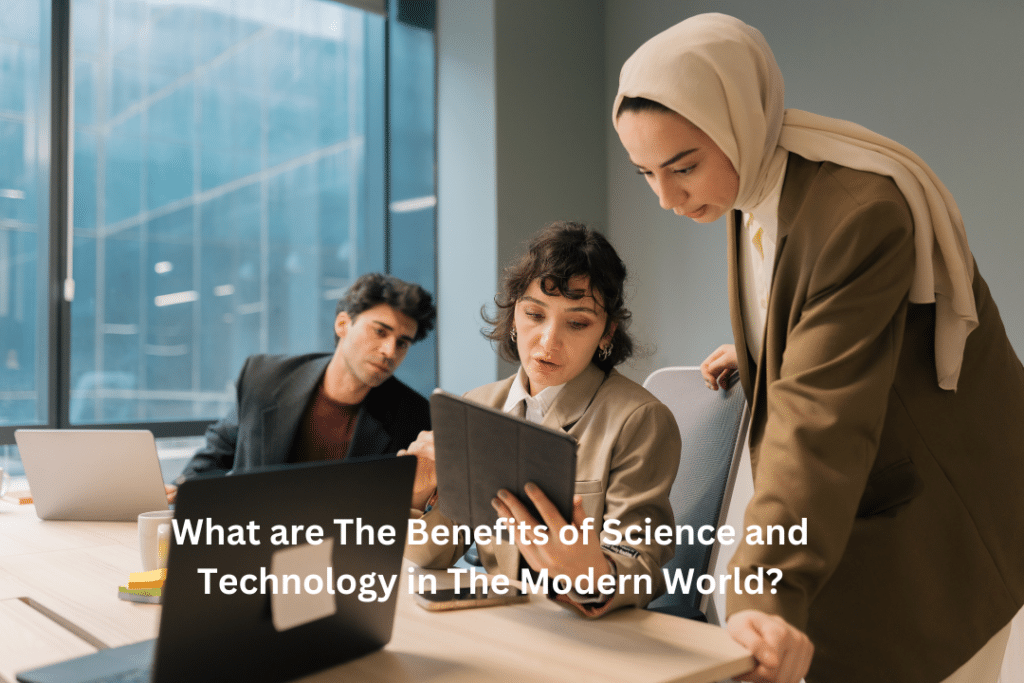The Benefits of Science and Technology in The Modern World by improving healthcare, communication, and productivity. Their role in modern society is crucial for innovation and economic growth.
In the bustling world of today, science and technology stand as twin pillars that significantly shape our day-to-day existence. Their advancements have not only streamlined numerous aspects of personal and professional life but have also brought about monumental changes in how we interact with our environment.
From smartphones that connect us globally in seconds to medical technologies that can predict diseases before symptoms appear, the benefits are profound and far-reaching. Such progress continues to drive economic growth and improve the quality of life, demonstrating the power and importance of science and technology in shaping a better future for all.

Enhancing Health and Longevity
Science and technology serve as vital catalysts in promoting health and extending lifespans. Through medical advancements and innovative health solutions, they play a pivotal role in enhancing our well-being and longevity. These strides exemplify the profound impact modern science has on society.
The intersection of science and technology has catalyzed groundbreaking advancements in healthcare, fundamentally transforming the way we manage and improve human health. From pioneering medical treatments to the innovation of health-monitoring devices, the influence of modern science is undeniably pivotal in promoting longevity and enhancing the quality of life.
Pioneering Medical Treatments
- Genetic therapy:
Genetic therapy has opened new doors for curing inherited diseases by directly fixing genetic abnormalities at their source, offering hope for conditions once deemed incurable.
- Personalized medicine:
Tailoring treatment plans to individual genetic profiles, personalized medicine ensures that patients receive the most effective therapies for their specific needs, reducing side effects and improving outcomes.
- Robotic surgery:
The precision of robotic surgery reduces the risk of complications, shortens recovery times, and makes previously inoperable conditions treatable.
The horizon of medical treatment has expanded exponentially due to these scientific endeavors, enabling diseases to be tackled with an accuracy and success rate previously unimagined.
Revolutionizing Preventative Care
Science has not only improved treatment but also revolutionized preventative care, empowering individuals to take proactive steps toward maintaining their health.
- Wearable technology:
Wearable devices track vital signs in real time, providing data that can predict and prevent serious health events before they occur.
- Mobile health applications:
These apps encourage healthy habits, provide access to medical information, and connect users with healthcare professionals remotely.
- AI-driven diagnostics:
Artificial intelligence algorithms analyze patterns in medical data, enabling early detection of conditions such as cancer, often before symptoms appear.
By harnessing these technological advancements, society is better equipped to prevent illness, significantly contributing to longer and healthier lives.
The synergy of science and technology in healthcare is a testament to human ingenuity, illustrating that the pursuit of knowledge can lead to tangible benefits that enhance our collective well-being. As we look to the future, the potential for further innovations to improve health and extend life expectancy is boundless, promising a continued positive impact on society at large.

Facilitating Seamless Connectivity
Science and technology bridge gaps, uniting the world through enhanced communication networks. This synergy propels societal progress as seamless connectivity becomes a cornerstone of modern advantages, fostering global collaboration and innovation.
As we navigate through the digital era, the imperative role of science and technology in fostering seamless connectivity cannot be overstated. This interconnectivity is the lifeline of modern society, influencing everything from personal communication to global business operations.
Bridging Geographical Gaps
- Instant communication: With advancements in telecommunications, messages and information traverse the globe in milliseconds, eliminating the delays once inherent to long-distance interactions.
- Remote work and collaboration: Technology enables individuals and teams to work together from different parts of the world, promoting a culture of digital nomadism and international cooperation.
The elimination of physical barriers through modern science has revolutionized the way we interact, learn, and do business, making the world a smaller place.
Enhancing Social Networks
Gone are the days of waiting weeks for a letter to arrive. Modern science has given us social media platforms and instant messaging apps that keep us connected to friends, family, and colleagues no matter where they are.
- Relationship building: Online networks provide a space for people to maintain relationships and meet new friends, fostering a sense of global community.
- Access to support groups: Individuals seeking advice or going through similar life experiences can easily find and join support groups, offering comfort and understanding from peers worldwide.
This digital interconnectedness has not only simplified communication but also enriched our social lives by creating communities transcending physical boundaries.
Empowering E-commerce And Trade
The digital marketplace is booming, thanks to the seamless connectivity enabled by science and technology. Buying and selling have never been more accessible, with online platforms catering to every conceivable need.
- Global marketplaces: E-commerce websites allow businesses to reach customers across the world, expanding their reach beyond traditional brick-and-mortar limitations.
- Streamlined logistics: Technology has improved supply chain management, making it more efficient to track, deliver, and receive goods on a global scale.
Science and technology have thus become the backbone of modern commerce, driving economic growth and consumer satisfaction.
Advancing Emergency Response Systems
In times of crisis, connectivity can make the difference between life and death. Modern science has improved our ability to respond to emergencies with speed and precision.
- Real-time alerts: Emergency notifications can be disseminated quickly through various channels, ensuring that people receive crucial information when it matters most.
- Coordinated rescue efforts: GPS and communication technologies facilitate the efficient coordination of rescue teams, significantly improving the outcomes of emergency situations.
The advancements in connectivity are not only about convenience; they’re also about safeguarding lives and enhancing the capacity for humanitarian assistance.

Science And Technology In Daily Life
Science and technology shape our modern society by streamlining daily tasks and opening new avenues for innovation. Their integration into everyday life enhances efficiency, from medical advancements to the convenience of smart devices, showcasing the profound impact and benefits that scientific progress provides.
In the tapestry of modern existence, science and technology are the vibrant threads that add both convenience and efficiency to our daily routines. The influence of these twin pillars of progress is so pervasive that their role is often taken for granted, yet a closer look reveals their transformative power in the minutiae of our lives.
Simplifying Household Chores
- Robotics in cleaning: Robots have taken over tedious household tasks like vacuuming, offering us the luxury of clean spaces without the effort.
- Smart appliances: Refrigerators that track our groceries and ovens that can be preheated remotely are no longer futuristic dreams but current realities enhancing our kitchen experiences.
The emergence of smart home technology and robotics has revolutionized the way we maintain our living spaces, liberating time for leisure and family bonding.
Healthcare Advancements
The realm of healthcare has witnessed a seismic shift thanks to science and technology, leading to improved patient outcomes and streamlined care delivery. Telemedicine now allows for remote consultations, reducing the need for physical hospital visits. Cutting-edge research has also led to the development of novel treatments and drugs, empowering us in the fight against previously formidable diseases.
Education Transformation
- E-learning platforms: Access to a vast array of courses and information has democratized education, making it accessible to anyone with an internet connection.
- Interactive tools: Virtual labs and simulations have made learning more hands-on, even from a distance.
The digitization of education has shattered geographical barriers, ushering in an era where knowledge is available at our fingertips, regardless of location.
Environmental Monitoring And Protection
In the crusade against environmental degradation, science and technology serve as our most potent weapons. Advanced sensors and satellites monitor climate patterns and pollution levels, providing data crucial to the formulation of conservation strategies. Renewable energy technologies such as solar and wind power offer sustainable alternatives to fossil fuels, showcasing how innovation can lead to a greener planet.
Transportation Efficiency
Gone are the days of tedious journey planning and unpredictable travel. GPS systems guide us to our destinations with precision, while advancements in automotive technology have resulted in more fuel-efficient and safer vehicles. Public transport too has been enhanced with the integration of real-time tracking and mobile ticketing, simplifying the commuter experience.
Workplace Productivity
- Automation tools: Repetitive tasks are increasingly automated, freeing employees to focus on creative and strategic responsibilities.
- Communication technology: Collaborative software and platforms enable seamless interaction among teams, irrespective of physical location.
Technology’s influence on the workplace is undeniable, shaping a future where efficiency and collaboration are at the forefront of professional success.
In every facet of our day-to-day activities, the synergy between science and technology propels us towards a smarter, more connected, and more efficient society. From the moment we wake up to technology-facilitated health, education, and environmental stewardship, we are enveloped in a world that continually evolves to better serve humanity.
This symbiosis is not just about convenience; it’s a testament to the ingenuity of the human spirit and its ceaseless quest for improvement.

Impact On Communication And Information Access
Science and technology have revolutionized communication, granting instant access to information globally. The modern world benefits immensely, with science playing a pivotal role in society by breaking barriers and enhancing connectivity. These advancements showcase the undeniable advantages of modern science.
Impact On Communication
The digital age has revolutionized the way we share information and connect with others. Gone are the days of waiting weeks for a letter to arrive. Science and technology have introduced a plethora of innovative communication tools that facilitate instant connections across the globe.
Information Access At Our Fingertips
- Online databases and libraries: These vast reservoirs of knowledge allow individuals to research and acquire information on virtually any topic within seconds.
- Search engines: Tools like Google have made it possible to find detailed answers to specific queries instantly, drastically reducing research time.
- E-books and digital publications: They provide convenient access to a wide range of reading material, from classic literature to the latest research papers, without the need for physical storage.
- Social media platforms: Sites such as Twitter and Facebook not only serve as communication channels but also as sources of real-time news and information.
Embracing the marvels of science and technology has led to a society that is more informed and connected than ever before. With just a few clicks, we can reach out to experts, delve into new subjects, and stay updated with global events—all thanks to the profound impact on communication and information access.

Technological Advancements In Transportation And Mobility
Technological advancements in transportation and mobility underscore the vast benefits of science and technology in our daily lives. These innovations enhance societal efficiency and connectivity, showcasing the pivotal role of modern science in shaping a progressive society.
The modern world has witnessed a revolution in transportation and mobility, largely due to technological advancements. These innovations not only enhance the efficiency of moving people and goods but also contribute to economic growth and environmental sustainability.
Electric and Autonomous Vehicles
- Electric Vehicles (EVs): These cars are powered by electricity, which significantly reduces the emission of pollutants. Electric vehicles are a cornerstone in the shift towards a more sustainable future, offering a cleaner alternative to fossil fuel-driven transportation.
- Self-driving cars: Autonomous vehicles, equipped with sensors and AI, promise to improve road safety by reducing human error. They also hold the potential to transform mobility for those unable to drive, such as the elderly and disabled, granting them greater independence.
Hyperloop and High-speed Rail
In pursuit of faster travel times, several countries are investing in hyperloop technology and high-speed rail systems. These methods of transport aim to drastically cut down travel durations between major cities and boost connectivity.
- Hyperloop: This proposed mode of passenger and freight transportation would propel a pod-like vehicle through a vacuum tube at incredibly high speeds, far surpassing those achievable by traditional rail.
- High-speed Rail: Trains operating on these systems can travel at speeds exceeding 250 km/h (155 mph), making them a competitive option for intercity travel, especially in densely populated regions.
Advancements in Aviation Technology
The aviation industry has seen remarkable progress, with new technologies making air travel safer and more efficient.
- Fuel Efficiency: Modern aircraft design and engine technology are increasingly focusing on fuel efficiency. This not only lowers operational costs but also reduces the carbon footprint of air travel.
- Navigation Systems: Advances in GPS and air traffic management systems have improved the accuracy of flight paths and the efficiency of airspace usage, minimizing delays and enhancing passenger safety.
The Impact Of Ride-sharing And E-bikes
Ride-sharing platforms and electric bikes represent a shift in urban mobility, emphasizing shared usage and sustainability.
- Ride-Sharing Services: Companies like Uber and Lyft have transformed transportation by providing convenient, on-demand mobility services that can be accessed via smartphone apps, reducing the need for personal car ownership.
- E-bikes: Electric bicycles offer an eco-friendly alternative to motor vehicles for short trips. They’re also instrumental in promoting physical activity and reducing traffic congestion in urban areas.
Satellite Navigation and Real-time Tracking
Modern transportation is heavily reliant on satellite navigation systems such as GPS, GLONASS, and Galileo. These systems provide precise location tracking, which is crucial for route planning and fleet management.
- GPS Technology: GPS devices in vehicles aid in navigation and can reroute drivers based on real-time traffic conditions, thereby optimizing travel times and reducing fuel consumption.
- Real-time tracking: The ability to track the location of vehicles and cargo in real-time has enhanced logistics and supply chain management, enabling companies to operate more efficiently.
The interplay between science and technology has undeniably reshaped transportation and mobility, making it safer, faster, and more environmentally friendly. These advancements continue to push the boundaries of what’s possible, forging pathways to a more interconnected and sustainable world.

Advantages Of Modern Science And Technology
Modern science and technology streamline daily tasks, enhancing efficiency and productivity across various industries. Their role in modern society is pivotal, driving innovation and offering solutions to complex global challenges, thereby significantly improving quality of life.
Science and technology stand as the twin pillars supporting the edifice of modern society, revolutionizing our lives and reshaping our world. The myriad benefits they offer touch every aspect of our daily experience, from the way we communicate to the manner in which we tackle global challenges.
Enhanced Medical Treatments And Healthcare
The advancements in medical science and technology have led to groundbreaking treatments and improved healthcare services. The integration of innovative tools and research has resulted in:
- Early detection of diseases: Through sophisticated imaging and diagnostic tools, illnesses can be identified in their nascent stages, leading to more effective treatments.
- Tailored medical therapies: Personalized medicine allows for treatments to be customized to individual genetic profiles, increasing their efficacy.
- Robotic surgery: Surgeons can perform complex procedures with greater precision and control, minimizing the risk of complications and speeding up recovery times.
Streamlined Communication And Information Access
The digital revolution has transformed the way we connect and access information. A prime example is the internet, which serves as a global repository of knowledge and a platform for instant communication. The benefits include:
- Immediate connectivity: People can communicate across vast distances in real time, facilitating business, education, and personal relationships.
- Access to information: The wealth of knowledge available online empowers individuals to learn, research, and make informed decisions.
- Social media impact: These platforms have become instrumental in social engagement, news dissemination, and even in influencing political landscapes.
Environmental Conservation And Sustainability
Modern science and technology are instrumental in the pursuit of environmental preservation and sustainable practices. Innovations in this field have led to:
- Renewable energy solutions: Technologies harnessing wind, solar, and geothermal power reduce dependence on fossil fuels and lower greenhouse gas emissions.
- Waste management advancements: Improved recycling techniques and waste-to-energy systems help mitigate the problem of solid waste.
- Conservation efforts: Satellite imagery and tracking technologies aid in monitoring wildlife and ecosystems, enabling better protection and management of natural resources.
Boost In Economic Growth And Productivity
The synergy between science and technology has been a key driver of economic expansion and increased productivity. Automation and technological tools have:
- Enhanced manufacturing efficiency: Robotics and AI have streamlined production processes, reducing costs and improving output quality.
- Enabled new industries: Sectors such as biotechnology, information technology, and nanotechnology have emerged, creating jobs and fostering innovation.
- Globalized the economy: Technology has made it easier for businesses to operate internationally, opening up new markets and opportunities for growth.
The tapestry of modern civilization is interwoven with the threads of scientific and technological advancement, bringing about an era of unprecedented possibilities. As we continue to explore and innovate, the horizon of what we can achieve expands, promising a future that is healthier, more connected, and sustainable.
Addressing Global Challenges Such As Climate Change And Resource Scarcity
Science and technology stand at the forefront of tackling global challenges, offering innovative solutions to climate change and resource scarcity. Harnessing cutting-edge research and advancements, they play a pivotal role in shaping a sustainable future, underpinning modern society’s resilience and progress.
Science and technology stand as pillars in addressing some of the most pressing challenges faced by modern society, including climate change and resource scarcity. By harnessing innovative solutions and cutting-edge research, we can pave the way toward a more sustainable and resilient future.
Tackling Climate Change Through Advanced Technologies
The surge in technological advancements provides a beacon of hope in mitigating the effects of climate change. From renewable energy solutions to carbon capture technologies, the application of science is crucial in reducing our environmental footprint.
- Renewable energy systems: These include solar, wind, and hydroelectric power technologies that produce electricity without emitting greenhouse gases during operation. By replacing fossil fuels, these systems significantly cut down on global carbon emissions.
- Carbon capture and storage (CCS): This technology involves capturing carbon dioxide emissions from sources like power plants and storing it underground to prevent them from entering the atmosphere. CCS is essential in the transition towards cleaner industrial processes.
- Climate modeling and forecasting tools: Enhanced by supercomputing and big data analytics, these tools offer precise predictions about climate patterns, helping governments and organizations to prepare more effectively for weather-related disasters.
Addressing Resource Scarcity With Scientific Innovations
Resource scarcity poses a significant challenge, especially in regions with limited access to clean water, fertile soil, and essential minerals. Science and technology provide strategic solutions that ensure sustainable resource management and equitable distribution.
- Water purification and desalination technologies: These innovations make it possible to convert seawater into drinkable water and purify polluted water sources, thus addressing the critical issue of water scarcity in arid regions.
- Agricultural biotechnology: By developing drought-resistant crops and improving crop yields through genetic modification, scientists are able to enhance food security in resource-limited settings.
- Recycling and waste management technologies: Advanced sorting and recycling technologies enable more efficient processing of waste materials, turning what would be trash into valuable resources.
By continuously exploring and implementing these scientific and technological advancements, we not only tackle immediate challenges but also contribute to long-term sustainability goals. The role of science in modern society cannot be overstated, as it provides the tools needed to create a balance between human development and environmental conservation.
Driving Economic Growth And Fostering New Industries
Science and technology propel economic expansion by unlocking innovative industries. Their integration into society yields unparalleled advantages, enhancing efficiency and spawning cutting-edge sectors that shape modern life.
In today’s rapidly evolving world, the impact of science and technology on economic growth is undeniable. These fields not only drive progress but also spawn entirely new industries, fundamentally reshaping the economic landscape. From revolutionary tech startups to breakthrough scientific research, let’s explore how these domains are pivotal in propelling economic advancements and nurturing novel sectors.
Boosting Productivity Across Sectors
Science and technology serve as the backbone of increased productivity in various industries. This improvement is primarily due to the integration of new technologies and scientific approaches that optimize performance and reduce waste.
- Automation and Robotics: These technologies streamline operations in manufacturing, leading to faster production rates and lower labor costs.
- Data Analytics: By harnessing the power of big data, companies can make more informed decisions, enhancing operational efficiency and boosting output.
- Agricultural Innovations: Scientific advancements in genetically modified crops and agricultural drones improve yield and reduce the incidence of crop failure.
Creation Of High-value Industries
The advent of cutting-edge technologies has led to the formation of entirely new industries, which are becoming significant contributors to global economic growth.
- Renewable Energy Sector: Innovations in solar, wind, and bioenergy technologies have created a robust new industry focused on sustainable energy solutions.
- Biotechnology: This field uses biological processes to develop products and technologies that help improve our lives and the health of our planet.
- Information Technology: The IT industry has seen exponential growth with advancements in cloud computing, AI, and machine learning, driving demand for skilled professionals and new business models.
Embracing science and technology not only fuels economic development but also ensures a competitive edge in the global market. As these fields continue to evolve, they promise to offer even more opportunities for economic diversification and growth in the years to come.

Frequently Asked Questions
What Are The Benefits Of Science And Technology In The Modern World?
Science and technology enhance healthcare, streamline communication, and boost productivity. They foster innovation, improve education, and facilitate environmental sustainability. These advancements also expand global connectivity and increase access to information, enriching everyday life across the globe.
What Are 10 Advantages Of Science?
Science boosts medical advancements, enhancing healthcare. It drives technological progress, improving daily life. Science fuels economic growth and job creation. It encourages critical thinking and problem-solving skills. Science helps address environmental issues. It expands our understanding of the universe. Science fosters innovation and creativity.
It improves communication and connectivity. Science aids in disaster prediction and management. It educates and empowers communities globally.
What Are The Benefits Of Science, Technology, And Society?
The benefits of science, technology, and society include improved healthcare, efficient communication, enhanced education, and advanced transportation. These advancements foster economic growth and elevate overall quality of life.
What Are The Pros And Cons Of Science?
Pros of science include advancements in technology, improved healthcare, and enhanced quality of life. Cons involve ethical dilemmas, environmental damage, and potential misuse of scientific discoveries.
Conclusion
Embracing the advancements of science and technology has revolutionized our everyday lives. From healthcare breakthroughs to communication leaps, the impact is undeniable. Society thrives as innovation fuels progress, offering countless benefits. Let’s continue to support and integrate these developments for a brighter, more efficient future.









